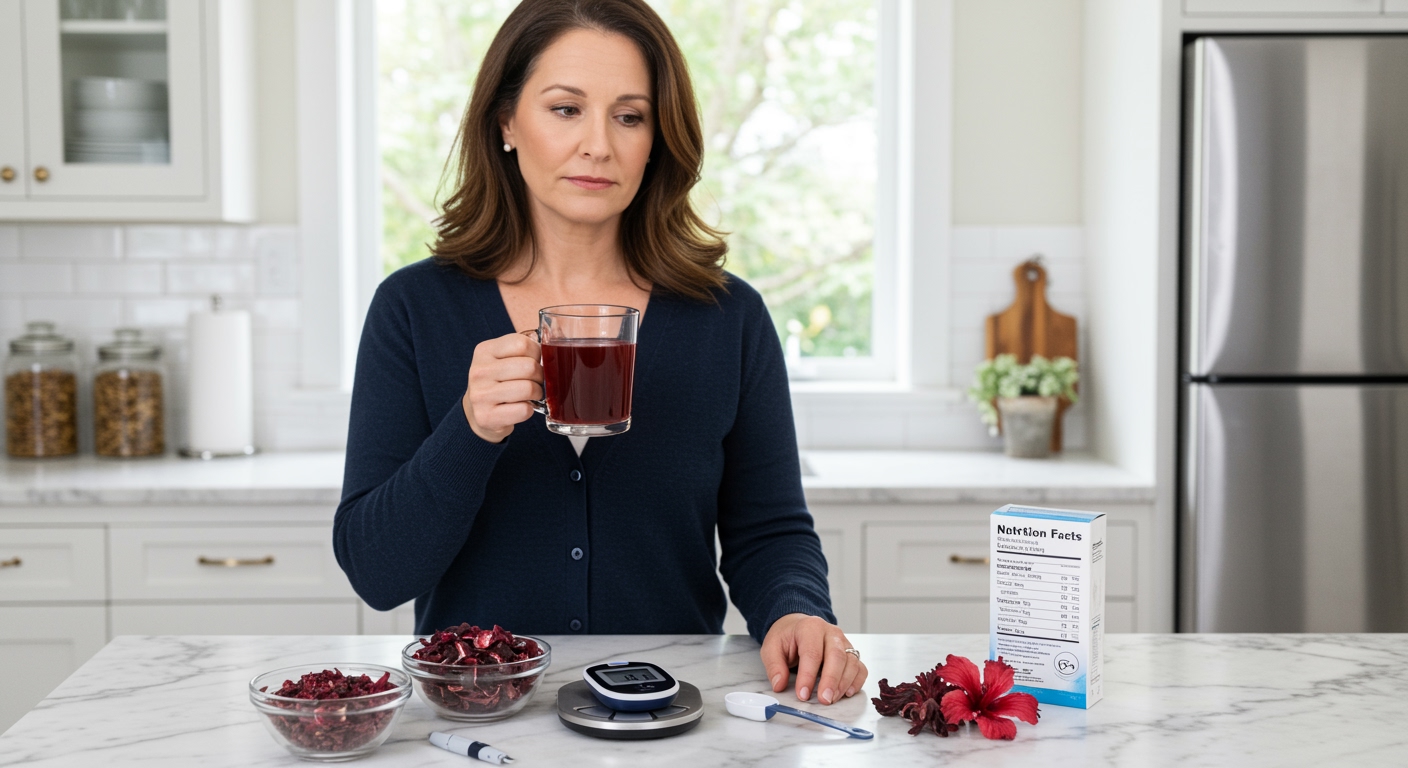✪ Key Takeaway: Hibiscus tea may help lower blood sugar levels, but individual responses vary and require careful monitoring.
Introduction
Your morning tea ritual might hold the key to better blood sugar control, but not all teas are created equal.
You might be wondering if that beautiful ruby-red hibiscus tea sitting in your pantry could actually help manage your diabetes or if it might cause unexpected blood sugar spikes.
Hi, I’m Abdur, your nutrition coach, and today I’m going to explain exactly how hibiscus tea affects your blood sugar levels and whether it belongs in your diabetes management plan.
What Does Science Say About Hibiscus Tea and Blood Sugar?
Research shows that hibiscus tea contains powerful compounds called anthocyanins that can help lower blood glucose levels.
These antioxidant compounds work by improving insulin sensitivity and slowing down the absorption of carbohydrates in your digestive system.
A study published in the Journal of Nutritional Science found that people who drank hibiscus tea regularly showed significant improvements in their fasting blood sugar levels compared to those who did not.
The active compounds in hibiscus also help your body use glucose more efficiently by enhancing the function of insulin receptors on your cells.
However, the blood sugar lowering effects are not dramatic enough to replace your diabetes medications or drastically change your management plan.
Think of hibiscus tea as a supportive tool rather than a miracle cure for diabetes management.
✪ Fact: Hibiscus tea contains zero calories and no added sugars, making it naturally diabetes-friendly.
How Much Hibiscus Tea Should You Drink?
The optimal amount of hibiscus tea for blood sugar benefits appears to be 2-3 cups per day based on current research.
Most studies that showed positive effects used doses equivalent to drinking about 240-480 ml of hibiscus tea daily.
You should start with just one cup per day and monitor how your blood sugar responds before increasing your intake.
The timing of when you drink hibiscus tea can also impact its effectiveness on your blood glucose levels.
Drinking it 30 minutes before meals may help slow down carbohydrate absorption and prevent post-meal blood sugar spikes.
Remember that individual responses to hibiscus tea can vary significantly based on your current medications, overall health status, and diabetes type.
Always test your blood sugar levels regularly when adding any new food or drink to your routine to understand how your body responds.
✪ Pro Tip: Keep a food diary to track how hibiscus tea affects your individual blood sugar patterns.
Are There Any Risks or Side Effects?
While hibiscus tea is generally safe for most people with diabetes, there are some important precautions you need to know about.
Hibiscus can lower blood pressure significantly, which might be problematic if you already take blood pressure medications.
The combination of hibiscus tea and blood pressure medications could cause your blood pressure to drop too low, leading to dizziness or fainting.
Some people experience stomach upset or nausea when drinking hibiscus tea on an empty stomach, especially in larger quantities.
If you take diabetes medications like metformin or insulin, the blood sugar lowering effects of hibiscus might enhance these medications and potentially cause hypoglycemia.
Pregnant women should avoid hibiscus tea completely as it can stimulate menstruation and potentially cause complications during pregnancy.
Always consult with your healthcare provider before adding hibiscus tea to your diabetes management routine, especially if you take multiple medications.
✪ Note: Stop drinking hibiscus tea immediately if you experience unusual symptoms or blood sugar fluctuations.
How Does Hibiscus Compare to Other Teas?
When compared to other popular teas, hibiscus tea offers unique advantages for people managing diabetes.
Green tea contains catechins that also help with blood sugar control, but hibiscus provides different antioxidants that work through separate pathways.
Black tea can be beneficial for diabetes management, but it contains caffeine which might affect sleep patterns and stress hormones that influence blood sugar.
Hibiscus tea is naturally caffeine-free, making it a better choice for evening consumption without disrupting your sleep cycle.
The vitamin C content in hibiscus tea is significantly higher than most other herbal teas, providing additional immune system support for diabetics.
Unlike sweetened commercial teas, pure hibiscus tea has a naturally tart flavor that does not require added sugars or artificial sweeteners.
You can combine hibiscus with other diabetes-friendly herbs like cinnamon or ginger to create custom blends that enhance both flavor and potential health benefits.
✪ Pro Tip: Rotate between different herbal teas to maximize variety in antioxidants and prevent flavor boredom.
The Bottom Line
Hibiscus tea can be a valuable addition to your diabetes management toolkit when used thoughtfully and with proper medical guidance.
Small consistent changes in your daily routine often create the biggest long-term health improvements, and hibiscus tea represents exactly this type of sustainable habit.
I would love to hear about your experiences with hibiscus tea or any questions you might have about incorporating it into your diabetes management plan, so please share your thoughts in the comments below.
References
At NutritionCrown, we use quality and credible sources to ensure our content is accurate and trustworthy. Below are the sources referenced in creating this article:





